Pining for success: Pinoli takes home top honours at the 2023 Outstanding NZ Food Producer Awards

The country’s only pine nut producer defied the odds to pioneer a new business and took out the top prize in the 2023 Outstanding NZ Food Producer Awards.
Words: Emma Rawson Photos: Jim Tannock
Extracting a delicate nut from within the fortress shell of a pinecone takes determination and skill. Amateur nut harvesters often abandon the quest empty-handed, despite signs of the struggle in crushed nuts and marked fingers. Marlborough’s Andy and Barb Wilshire of Marlborough have persevered and found establishing a business from pine nuts has been just as tough a nut to crack as the kernels themselves.
In 1998, Andy and Barb founded Pinoli Premium Pine Nuts in the Wairau Valley, planting their strange-looking pines on a former sheep and fodder farm. At the time, their neighbours were busy with row after row of sauvignon blanc vines.
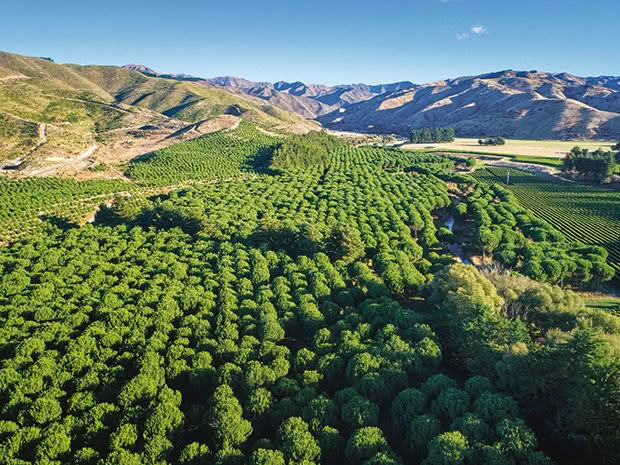
Scientists thought only a bunch of nutters would plant pine nut trees. Neither viable nor economic declared a research paper of Pinus pinea, the umbrella-shaped pine that produces edible pine nuts and is also known as a stone pine. Pine nuts had no future as a food business for this country, said the scientists.
Andy read the report and planted 1000 Pinus pinea anyway, and the following year he and general manager Lee Paterson planted a further 40 hectares.
“We joke about whether it was bravery or stupidity, but in all seriousness, we couldn’t contemplate failure. It simply had to work,” Andy says.
They had a thesis, and after years of patient waiting, eye-watering amounts of capital investment and step-over-the-ledge bravery, that view has largely come to fruition.
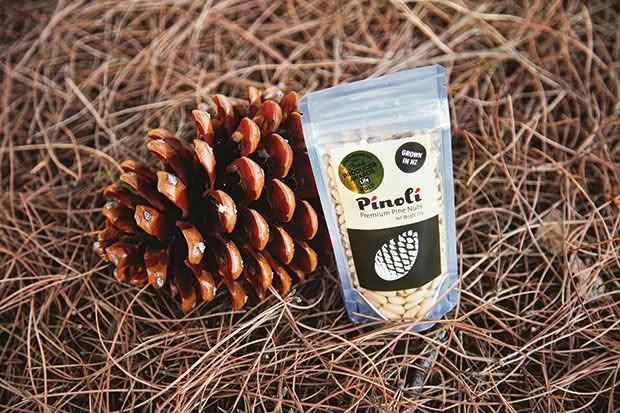
“I read the early scientific study but had done my own calculations. To me, it was a risk but also an opportunity, as no one else was doing it. I’m a forester by background, and we know Pinus radiata grows easily in New Zealand. I wondered if the land could be used for other related species. Plus, pine nuts are delicious, so we gave it a go.”
Since 1998, Lee and the team have planted 500,000 trees on 540 hectares from the Wairau Valley out to Cape Campbell on the east coast. They’re yet to make a profit as they continue to reinvest in scaling up their business. Andy funds the growth from his day job as a partner in an investment management firm. However, big rewards are on the horizon as exports of their pine nuts to Australia and Europe increase; local chefs and gourmands rave about the tiny ivory-coloured nuts.
Being named Supreme Winner of the 2023 Outstanding NZ Food Producer Awards won’t hurt things either.
Pine nuts are among the smallest products by size entered in the awards, yet these little nuts — technically a seed kernel — caused a big stir with the judges. “Excellent flavour and aroma with a nice little sweetness at the end. The best thing we tasted all day,” the panel raved.
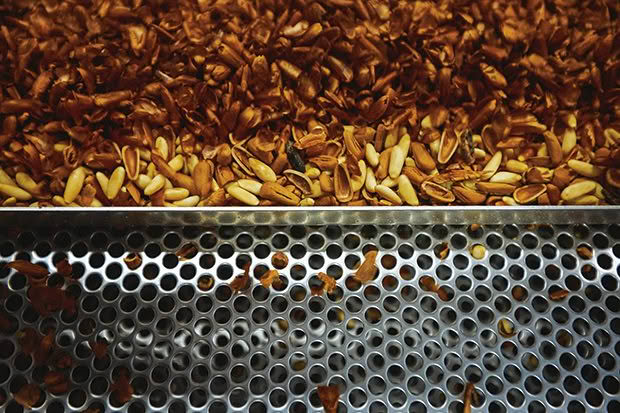
Andy isn’t 100 per cent sure but is pretty confident that Pinoli is the only pine nut producer south of Lebanon. When he started researching in the mid-1990s, many New Zealanders hadn’t even tasted pesto let alone it’s nuts (a key ingredient). Most of the world’s pine nuts are the Korean and Himalayan varieties, but Pinoli grows the Mediterranean type. The species originates in Spain and is prized by foodies for its superior taste, nutritional profile and large size.
“Pine nuts have an enormously long history as a human food source. Archaeological evidence indicates humans used pine nuts in
Neanderthal times as a nutritious protein and fat source. If you want to talk about a genuine paleo food, pine nuts are it,” says Andy.
“You can eat them raw, but it’s hard to beat them dry-toasted in a pan or even fried in a little butter to get a slight brown caramelisation on the nuts. They are small but transformative sprinkled on a salad and many other dishes.”
There are sustainability concerns about harvesting the Korean variety, grown mainly in China, and geopolitical uncertainty in Middle Eastern areas where the Himalayan variety is grown. Perhaps growing Mediterranean pine nuts at the bottom of the world in Aotearoa wasn’t a nuts idea, after all?
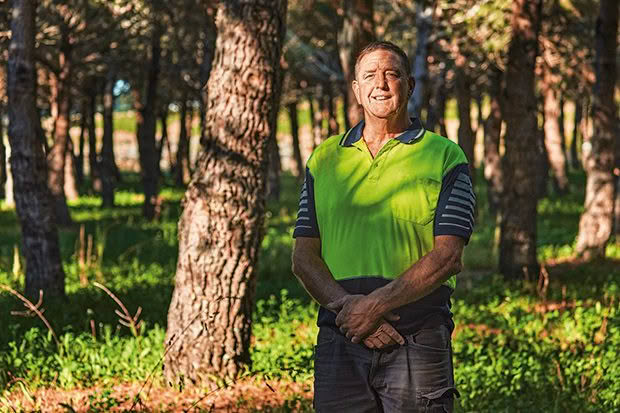
“With the good soils and great climate in New Zealand, we set out to grow the world’s best pine nuts. Do we have the best pine nuts in the world? I honestly can’t say, but we’re close. And we’re still innovating and trying to do it better.”
Pinoli is in the process of becoming certified organic and is nearly there. Unlike nut trees such as almond, stone pines don’t require irrigation. Sheep graze beneath the trees; no chemicals or herbicides are used on the trees or cones.
As pine nuts are an orchard crop, not a forestry crop, trees grow for many decades (100 years) and are not clear-felled like Pinus radiata.
There is no slash nor wilding pine issue. Pickers use a metal crook to knock the green pinecones from branches of younger trees, while larger trees with thicker trunks get a jostle from a mechanised tree-shaker.
The tricky bit is extracting the pine nuts from the cones, and Pinoli has invested millions in a solar-powered factory. First, the green cones are sun-dried to open the scales before the cone is broken in the factory. Then comes the most challenging part, separating the pine nut kernel from within the tough seed shell without damaging it, a delicate mechanical dance of wetting, drying and shaking. The kernels are then polished, washed and dried again before being sorted and packaged.
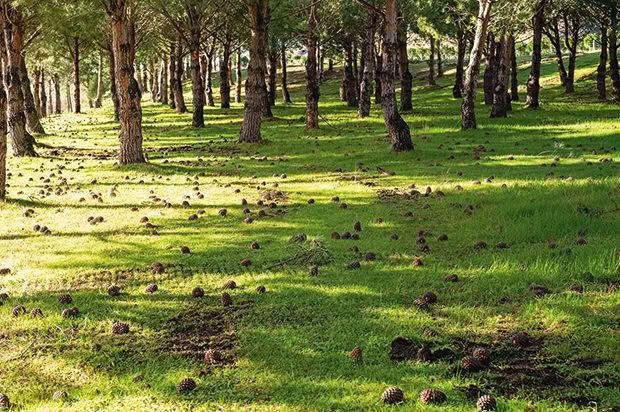
“We’ve often said that if we knew what was involved in processing and precisely how complex it was, we might not have ever started. But I’m glad we did because we now have a little world-class factory down here and a great team at Pinoli.”
The hard waste is good biomass energy, replacing coal in local tomato hothouse boilers. Local vineyards also use it as mulch. Pinecone waste might have future use in activated carbon for water and air filters.
Pine tree prunings are also mulched, and Andy and Barb’s home features a rustic table and chairs made from Pinus pinea timber.
“There are many regenerative parts to this business, with circular use being a net positive for the atmosphere.”
Though the Pinus pinea trees sequester carbon as effectively as the Pinus radiata Andy can see along the road, they don’t qualify for carbon credits under the Emissions Trading Scheme.
More Marlborough farmers have joined Pinoli growing the Pinus pinea, which could be the start of a new industry for New Zealand. That gets Andy excited.
“We have some new growers, so very shortly, we will have about 800 hectares of pine nut plantations. And from that, we can produce two per cent of the world’s Mediterranean pine nut crop because our growing conditions and productivity are so good here.
“With thousands of hectares of dry hill country near here and if we had a level playing field with the Emissions Trading Scheme and more farmers became interested in planting these Mediterranean pines, we could easily get to 8000 hectares. Then we could produce 20 per cent of this variety of quality and nutritious pine nuts.”
KERNEL OF TRUTH
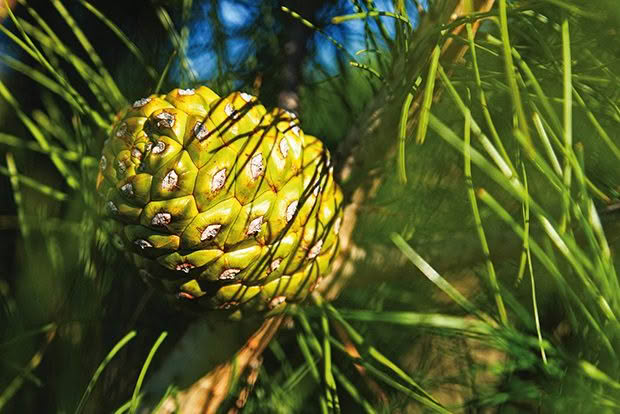
Growing pine nuts is a long game. It takes six years for the tree to produce its first cones; the crop is harvestable in eight to 10 years.
The trees can live to 100 years old, and in Spain, they reach peak production at 40 to 60 years old. In New Zealand, vigorous growth might see an earlier peak.
At 540 hectares, Pinoli’s planting is small by forest standards but enormous compared with fruit orchards.
Pinus pinea trees hold three years’ worth of cones on the tree simultaneously, but when the trees are shaken, only the mature fall. Generally, a tree will produce a bumper crop every three years. There are, on average, 120 kernels per cone.
You can find Pinoli’s recipe for a delicious lemon and pine nut tart here.
About the Outstanding NZ Food Producer Awards
The winners of the seventh Outstanding NZ Food Producer Awards make some of the most delicious food and drink Aotearoa has ever tasted. Salute the medallists and winners and show your support by buying their gourmet treats.
CATEGORY CHAMPIONS

Supreme Champion: Premium Pine Nuts, Pinoli, Marlborough
Emerson’s Paddock Champion: Organic Scotch Fillet & Pure Organic Beef Burger Patties, Moreish Premium Organic Butchery, Palmerston North
Dairy Champion: Oamaru Blue, Whitestone Cheese Co, Ōamaru
Seafood New Zealand Water Champion: Live Crayfish, Tora Collective, Tora Bay
Farro Earth Champion: Premium Pine Nuts, Pinoli, Marlborough
Label & Litho Drink Champion: Currant Crush, Pete’s Natural, Nelson
Free-From Champion: Mango Lassi Ice Cream, Little ‘Lato, Auckland
Find the full list of medallists here.
Love this story? Subscribe now!
 This article first appeared in NZ Life & Leisure Magazine.
This article first appeared in NZ Life & Leisure Magazine.
